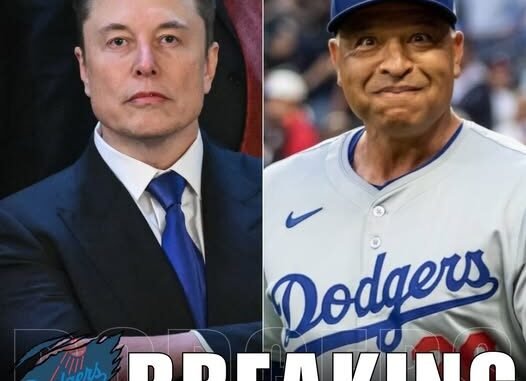
A Fictional Tale: The Dodgers Reject Elon Musk’s Tesla Sponsorship
In a stunning turn of events that sent shockwaves through the sports and business worlds, the Los Angeles Dodgers organization has reportedly rejected a staggering $500 million sponsorship offer from tech titan Elon Musk and his company, Tesla. The proposal, which would have been one of the largest naming rights deals in sports history, was met with a defiant and public rebuke from the Dodgers’ ownership, who declared, “We will NEVER be bought by billionaires like you; The Dodgers are not for sale — We stand with the people of Los Angeles City against greed, racism, and corporate exploitation.”
This unprecedented move has captivated the attention of sports journalists, political commentators, and fans alike. In an era where professional sports teams are often seen as little more than corporate assets, the Dodgers’ decision stands out as a powerful statement of principle. The rejection of such a massive sum of money in the name of community values is virtually unheard of in modern sports. While the full details of the offer have not been made public, sources close to the negotiations suggest that Musk’s proposal included renaming Dodger Stadium to “Tesla Field at Dodger Stadium,” along with extensive branding and promotional opportunities.
The Dodgers’ ownership group, led by chairman Mark Walter, has long been a quiet but powerful force in the community. Their public statement reveals a depth of conviction that few had anticipated. The use of strong, unequivocal language—”We will NEVER be bought,” “The Dodgers are not for sale”—suggests that this was not merely a business decision but a moral one. The ownership group’s public stance against “greed, racism, and corporate exploitation” takes a direct aim at the often-criticized practices of some of the world’s wealthiest individuals and corporations.
This bold declaration has resonated deeply with the city of Los Angeles, a place known for its vibrant mix of cultures and its long history of social activism. The Dodgers have always been more than just a baseball team; they are an integral part of the city’s identity. From their integration of Jackie Robinson in 1947 to their deep roots in the diverse communities of Southern California, the Dodgers have a legacy of standing for what is right. This latest move seems to be a continuation of that tradition.
The rejection of Musk’s offer also highlights a growing tension between the world of high finance and the values of public institutions like professional sports teams. In recent years, many sports teams have been criticized for their increasing commercialization, with corporate sponsorships often overshadowing the team’s connection to its fans and its home city. The Dodgers’ decision to prioritize their relationship with the community over a massive financial windfall could set a new precedent for other teams to follow.
The reaction from the sports world has been a mix of disbelief and admiration. Many analysts have praised the Dodgers for their courage, while others have questioned the financial wisdom of turning down such a lucrative offer. Some have pointed out that the $500 million could have been used to fund improvements to the stadium, invest in player development, or even lower ticket prices for fans. However, the Dodgers’ ownership has made it clear that some things are more valuable than money.
This incident also brings into focus the complex public image of Elon Musk. While he is widely celebrated for his innovative work with Tesla and SpaceX, he has also faced criticism for his controversial statements and business practices. The Dodgers’ public statement, with its pointed reference to “billionaires like you,” seems to be a direct challenge to Musk’s ethos. It suggests that the Dodgers organization is not willing to align itself with a figure who is seen by some as a symbol of the very corporate exploitation they are speaking out against.
The aftermath of this decision is likely to be felt for a long time. It has sparked a larger conversation about the role of sports teams in society and the responsibility of ownership to their fans and their community. Will other teams follow the Dodgers’ lead? Or will this be a one-off event, a singular moment of defiance in a world increasingly dominated by corporate interests? Only time will tell. But for now, the Los Angeles Dodgers have made a powerful statement that will be remembered for years to come. They have shown that some things truly are priceless, and that the integrity of a team and its connection to its community are not for sale.
Leave a Reply